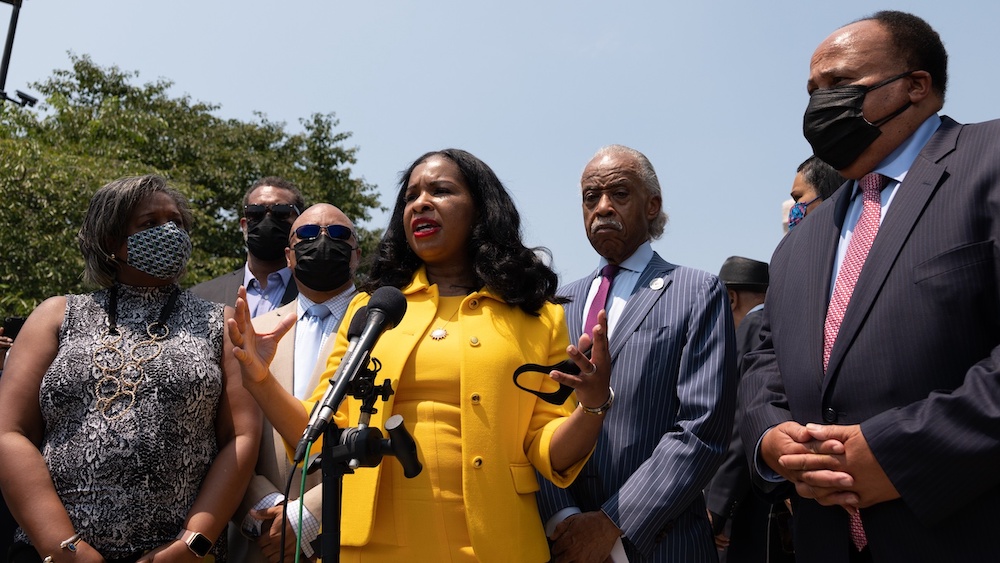If you’re interested in sharing your opinion on any cultural, political or personal topic, create an account here and check out our how-to post to learn more.
Opinions are the writer’s own and not those of Blavity's.
____
Exactly 56 years ago, the Voting Rights Act was signed into law by President Lyndon Johnson, finally prohibiting racially discriminatory voting laws, like poll taxes and literacy tests, nearly a century after the ratification of the 15th amendment.
But only a year before its passage, President Johnson told my late father-in-law, Dr. King, that voting rights would have to wait — he said he’d spent all his political power and currency on the Civil Rights Act. But Dr. King did not wait. With a relentless coalition of nonviolent resistance leaders, Dr. King resolved to go back to the South and build the power and movement needed to secure voting rights.
Dr. King and the movement leaders of that era understood something I would learn first-hand years later working alongside civil rights giants like Rev. C.T. Vivian and Anne Braden: our freedoms are never secure or complete. Like every precious thing in our lives — from our relationships to our health — our freedoms require close and constant attention. The fight for freedom, justice and equality never truly ends. In the words of my late mother-in-law Coretta Scott King: “Freedom is never really won, you earn it and win it in every generation.”
As we face a full-scale attack on the pillars of our democracy, our generation must heed these lessons from history to win our freedom once again. This year alone, more than 400 anti-voting bills have been introduced in virtually every state legislature. Since January, 18 states have passed laws that make it harder for millions of Black and brown people to vote. These laws go so far as criminalizing handing out water to voters waiting in long lines. They ban vote-by-mail, ballot drop boxes and other measures that expand access to the ballot box.
We have the Supreme Court’s decision in Shelby County v. Holder to thank for gutting a key provision of the Voting Rights Act, the very bill my in-laws, mentors and numerous coalitions of organizers put their lives on the line to pass. The Shelby decision struck down preclearance for state voting laws, making way for state lawmakers to systematically disenfranchise Black and brown voters, and usher in a new Jim Crow. We urgently need Congress and the President to pass federal protections, before the impact of these regressive anti-voting laws is felt for generations. So like our predecessors did in 1965, we must mobilize and harness our collective power to secure our rights.
I say that while intimately knowing the exhaustion that many of us feel right now. We’ve lived through one of the hardest years of our lives — a deadly pandemic, a historic global protest movement for Black lives, a massive voter registration and mobilization campaign, and a white supremacist insurrection on the Capitol attempting to overturn our votes. We’re in the midst of a violent backlash to our freedom, power and joy.
If you’re feeling that we’ve done enough and that now is the time for the leaders we elected to act, I am with you. But as movement greats have taught us, the people will always hold the power. Our leaders will not find the political will without us raising our collective voices and demanding our freedoms.
That is why, on August 28, we'll commemorate the March on Washington in D.C., Arizona, Texas, Georgia, Florida and other homes across the country where our rights are under threat. We’ll gather by the millions for the March On For Voting Rights to call on Congress to pass the For the People Act and the Voting Rights Act. In D.C., we’ll demand the Senate finally make D.C. a state, granting equal representation to the 700,000 mostly Black and brown residents of Washington who have no vote in Congress, because voting rights without D.C. statehood is not true freedom.
And most critically, we’ll demand Congress eliminate the filibuster — a Jim Crow relic that has blocked civil rights legislation, including over 200 anti-lynching bills, for centuries. It’s not enough to symbolically support voting rights. Supporting voting rights for Black and brown Americans implicitly means eliminating the filibuster.
As we call for our freedom and once again march for our rights, we must remember that brotherhood and sisterhood are the true order of business on the legislative agenda. It’s our collective power that will get this done, and the urgency is now.
____
Arndrea Waters King is a longtime activist who works on behalf of those who have been marginalized by helping them find — and collectively use — their voices for change. King currently serves as the President of the Drum Major Institute, which carries Dr. Martin Luther King's work and vision of radical nonviolence into the 21st Century.
